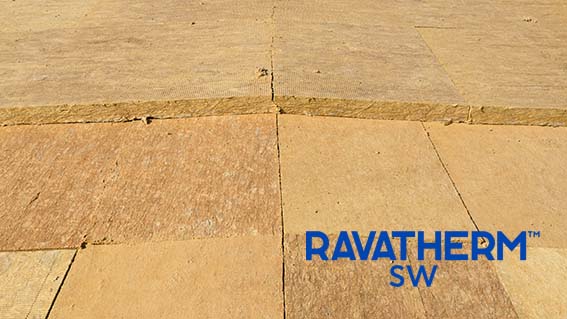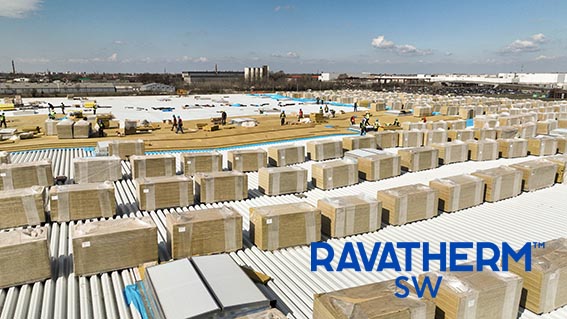Energy efficiency and sustainability have become crucial goals in construction industry today. Insulating homes plays a key role in reducing energy consumption and minimizing environmental impacts. Mineral wool insulation, specifically stonewool insulation, is an excellent solution that comes with several additional benefits. Let’s take a look at these advantages, when it is advisable to use stonewool insulation, and why.
What is stonewool insulation?
The basis of stonewool insulation comes from natural minerals, specifically rocks. Our RAVATHERM SW stonewool products are primarily made from basalt rock. The basalt rock is melted at high temperature and transformed into loosely bound fibers while retaining the positive properties of the rock. The outstanding thermal and acoustic insulation properties of stonewool insulation are also a result of the presence of air trapped between the mineral fibers. RAVATHERM SW stonewool insulation is a natural, durable, lightweight, and flexible material that is easy to install and does not release harmful substances. It maintains its shape and strength over long decades since it contains minimal amounts of organic materials, ensuring long-term effective insulation. Stonewool insulation helps reduce heating costs by minimizing heat loss in winter and heat gain in summer, thereby optimizing the energy efficiency of buildings and contributing to sustainable operation.

How is stonewool insulation made?
The raw material for stonewool insulation is basalt rock, which is formed through volcanic processes. The manufacturing process begins with melting. In the melting furnace, the vertically layered rock slides downward and continuously melts, flowing out as lava through the double-walled, water-cooled conical furnace. The molten rock, or lava, has a temperature of 1400-1500 °C, from which thin mineral fibers are formed through a special procedure. The resulting mineral fibers are collected and compressed into board form using a special heat-curing binder. In the curing furnace, the binder polymerizes and permanently fixes the mineral fibers, giving the stonewool insulation its final shape and properties.
So, the components of RAVATHERM SW mineral wool insulation board are as follows:
- basalt, which is also its main raw material
- another important element is the thermosetting resin
- as well as the hydrophobizing material, thanks to which it will have water-repellent properties
When should we use stonewool insulation?
Stonewool insulation is an excellent choice when aiming for effective thermal insulation in buildings. It is ideal to use in residential and industrial buildings, roofs, walls, and floors. Stonewool has exceptional thermal conductivity properties, reducing heat loss and energy consumption. Additionally, it provides excellent sound insulation, reducing the transmission of noise. Furthermore, it is fire-resistant and non-combustible, enhancing building safety. It is easy to handle, does not cause allergic reactions, and has a long lifespan. Stonewool insulation is not harmful to health, as the fibers it consists of do not cause any harm when inhaled and completely decompose in living organisms. The product is recyclable, does not generate hazardous waste, and does not contain environmentally harmful substances. Due to its structure, it is not waterproof. If waterproofing is an important criterion when selecting insulation, we recommend considering our RAVATHERM XPS products instead.
The advantages of stonewool insulation
In the previous discussion, we highlighted several advantages of stonewool insulation. Now, let’s take a closer look at its key properties.
Excellent thermal insulation capacity

Stonewool insulation meets the requirements imposed on it and is an extremely efficient thermal insulating material that significantly contributes to the energy efficiency of buildings. One of its main advantages is its excellent thermal resistance (R-value). This means it effectively prevents heat flow through building structures. Another crucial factor is the lambda (λ) value, which measures thermal conductivity, and the lower this value, the better the insulation property. Stonewool generally has a very low thermal conductivity, meaning it effectively retains heat and prevents heat loss. This enables significant energy savings in heating and cooling buildings. RAVATHERM SW stonewool has an excellent lambda value, and our products are available with a λ value starting from 0.038 W/mK, depending on the thickness. For more detailed technical information, you can download our Technical Data Sheets (and Declarations of Performance), which are provided in PDF format.
Let’s summarize the important technical data of RAVATHERM SW stonewool insulation in a table!
| Basic properties | RAVATHERM SW Roof 40 | RAVATHERM SW Roof 50 | RAVATHERM SW Roof 70 |
| Thermal conductivity (λ) | 0,038 W/mK | 0,038 W/mK | 0,039 W/mK |
| Compressive strength | CS(10) > 40 kPa | CS(10)> 50 kPa | CS(10) > 70 kPa |
| Point load | PL(5) > 450 N | PL(5) > 500 N | PL(5) > 700 N |
| Thickness | 60-140 mm | 60-140 mm | 50-120 mm |
Fire Protection with Stonewool Insulation
The fire-resistant properties of stonewool insulation offer significant advantages. The material does not melt at high temperatures – its melting point is above 1000 °C – and it does not release toxic gases. As a result, our RAVATHERM SW product is classified as Class A1 in terms of fire protection. Its application allows buildings with stonewool insulation to comply with fire safety regulations and minimize the risk of fire spread.
Not only Insulates but also soundproofs
Proper insulation enables a home to maintain the desired temperature for a longer period and reduces heating and cooling costs. Additionally, due to its structure, stonewool insulation possesses excellent soundproofing properties as it absorbs sound waves, thereby reducing noise penetration into the house and contributing to a more pleasant living environment. This can be particularly advantageous in areas with high noise pollution, such as near busy roads or airports.
Stonewool insulation is vapor-permeable.
The issue of moisture in homes can be a significant headache for many homeowners. However, stonewool insulation has excellent vapor permeability, which means it can regulate the humidity in the air. This prevents mold formation and damage caused by moisture. Ensuring a healthy indoor air quality requires proper moisture control, which can be achieved with the help of stonewool insulation.
Let’s summarize the advantages of stonewool insulation:
- Excellent thermal conductivity properties
- Provides excellent sound insulation
- also vapour permeable
- Fire-resistant and non-combustible material
- Easy to install and handle
- Not harmful to health, does not cause allergic reactions
- Long lifespan
- Resistant to foot traffic
If you want to make your building more energy-efficient and comfortable, it is worth considering stonewool insulation. This investment can have long-term benefits and also helps protect the environment. Trust professionals for the installation of stonewool insulation and enjoy the enhanced comfort and efficiency of your home. If you need further information about RAVATHERM SW stonewool products, please contact our experts.



Leave a Reply